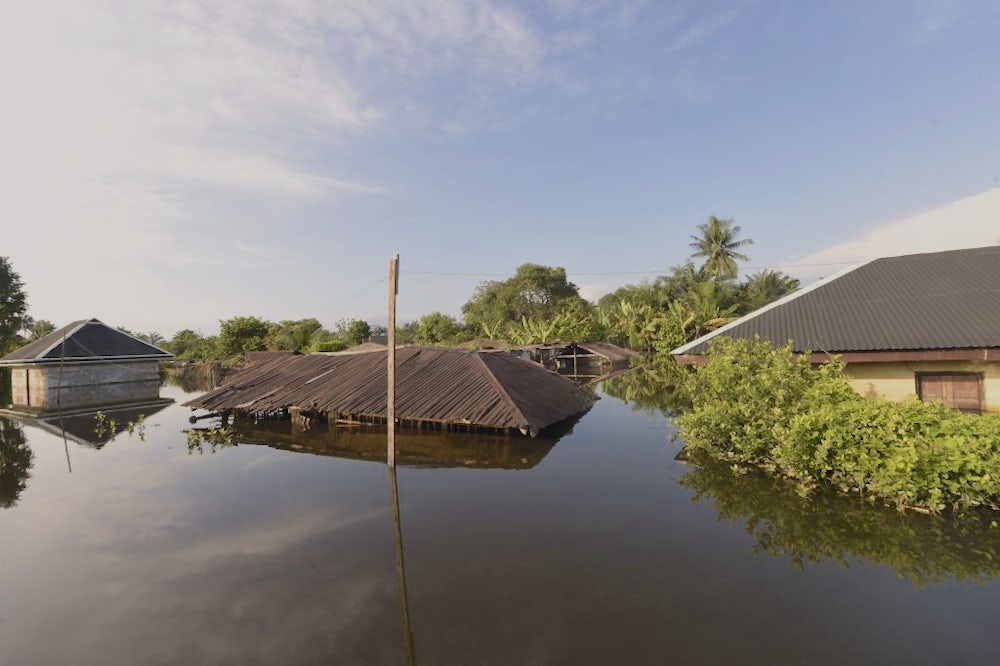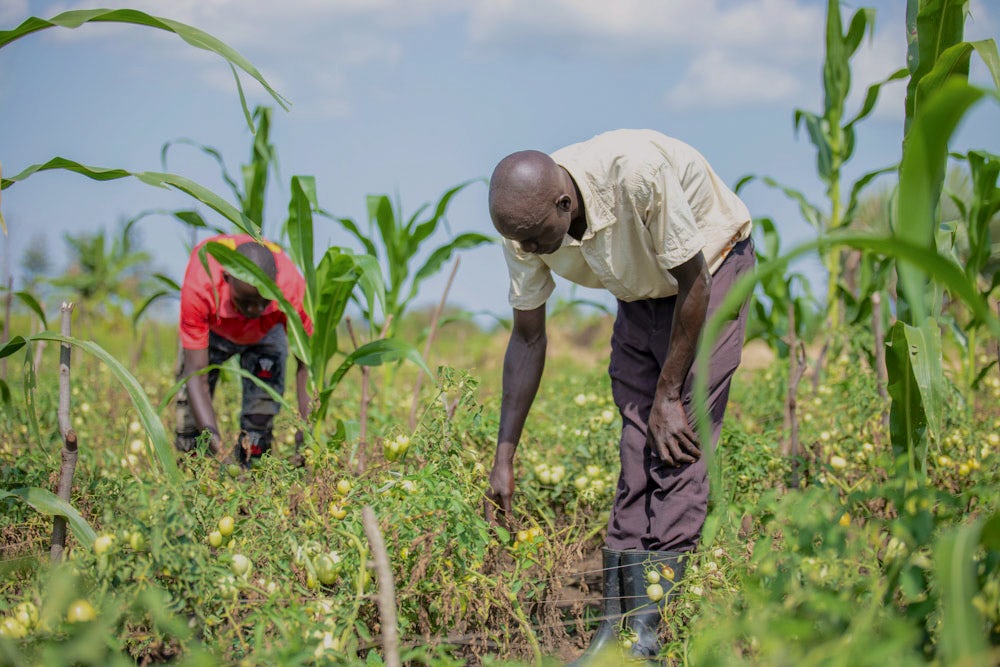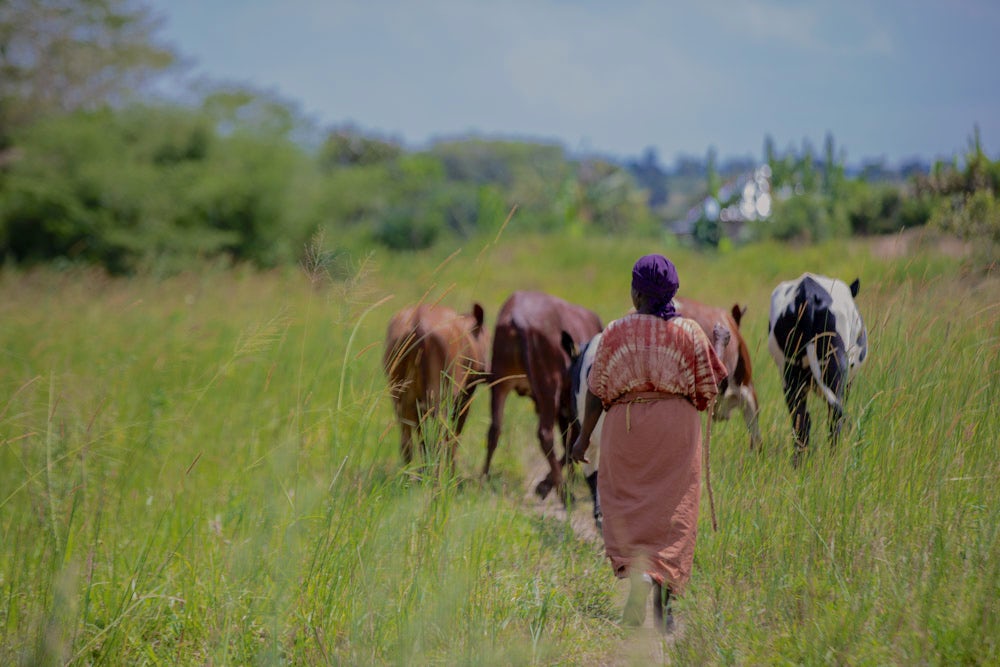Nigeria’s farmers, as well as its rapidly growing population, face a food insecure future after 140,000 hectares (about 346,000 acres) of farmland in 34 of the country’s 36 states were devastated by floods and heavier than expected rainfall in recent weeks.
The extent of the damage to farmland and crops may reduce access to food and diminish the quality of food across the nation, intensifying food insecurity, hunger and entrenched poverty.
Smallholder farmers make up more than 80% of farmers in Nigeria and account for 90% of local agricultural production — but most are uninsured or under-insured. Reducing the risks they face could support them to scale up production and improve their resilience to ever-increasing climate shocks.
Heifer International is committed to sustainably addressing the shortfall in crop insurance while supporting farmers with training on climate-smart agriculture and access to technology so they are better prepared to deal with climate events, like flooding.

“Building resilience will require a combination of interventions and more partnerships at all levels with governments, the private sector, and major international foundations as well as development institutions to de-risk farming in Nigeria,” said Adesuwa Ifedi, senior vice president of Africa programs for Heifer International.
“We need to promote climate-smart innovations in agriculture by working with farmers, their communities and market system actors to prepare for climate shocks and identify and invest in opportunities that deliver positive outcomes for farmers,” she said. “Smallholder farmers will be better supported if emerging technologies are leveraged to protect agricultural investments across Africa.”
However, this kind of program is uncommon in Africa and adoption of crop insurance programs has been weak because farmers have not been able to afford insurance premiums. In comparison, the United States crop insurance program covers more than 80% of American cropland and costs the government an average of nearly $9 billion per year.
Rufus Idris, Heifer’s country director for Nigeria, acknowledges the challenges and notes that rural communities lack the financial resources as well as the access to innovation and technology that could build resilience and better prepare them for shocks.
In 2021, through a collaboration with Pula Advisors, Olam Agri, Thrive Agric and Leadway Assurance Limited, Heifer introduced a pay-at-harvest insurance program: the Pay-at-Harvest Area Yield Index Insurance (AYII). It allows rice farmers a means of reducing their risk of crop loss from climate-related events while also restoring investors’ confidence in rice farming.
The pay-at-harvest model of insurance specifically addresses farmers inability to pay premiums early in the season. Farmers have insurance coverage at the start of a season but pay the premium after they have harvested and sold their produce. Farmers that experience covered crop losses from flood, drought, new pests and diseases can recover their investment.

“With farming in Nigeria considered high risk and liable to losses, Heifer International is collaborating with its partners to help smallholder farmers in Nigeria adapt to climate change and maximize their outputs,” said Rufus. “This program provides rice farmers in Nigeria with an affordable way to continue farming. Farmers get a full return if their insured farmland does not produce the projected quantity of crops due to a climate event.”
Nearly 20,000 smallholder rice farmers, 4,159 who were affected by the flood, are currently participating in the AYII project for the 2022 wet farming season, the annual rainy period that usually runs from April to October. This number is expected to grow to at least 100,000 farmers by June 2025.
While many parts of Nigeria are prone to annual floods, in recent years the extent of flood damage has become more severe. In some areas, homes and neighborhoods have been completely submerged by floodwaters. Nigeria's meteorological agency has warned the flooding could continue until the end of November in some southern states. The ministry has urged local governments to “prepare accordingly.”
As climate change fuels more extreme and unpredictable weather such as this, climate adaptation is critical. In Nigeria alone, the World Bank reports climate change inaction could cost the country between 6% and 30% of its gross domestic product by 2050, a loss equivalent of up to $460 billion.
Reji George, vice president for farming initiatives at Olam Agri, a partner in Heifer’s AYII insurance program and an agribusiness enterprise that has established Africa’s largest commercial rice farm in the town of Rukubi in Nasarawa State, says insurance provides a path forward for farmers and allows them to overcome climate- and weather-related challenges they may not otherwise be able to withstand.
“Olam has been negatively impacted by the devastating floods in its own 4,500 hectares (11,000 acres) of nucleus rice farm in Nasarawa State and also across its massive out-grower programs in the states of Nasarawa, Benue, Taraba, Plateau, Niger and Kogi,” he said. “The Area Yield Index Insurance has come to the rescue of these farmers.”
Safiyanu Suleiman, 37, a rice farmer in the flood-ravaged Awe Local Government Area of Nasarawa State, is one of them.
“In Azara community where I come from, we are heavily dependent on farming for income,” she said. “Most of our farms were submerged by the flood and only those of us who insured our farmlands through the Heifer International program are certain of a way out of this situation.”
Results from a study conducted by Pula, another of AYII’s implementing partners and an organization widely recognized for its work piloting crop insurance throughout Africa, show the insurance program has helped smallholder farmers double their yields, increase farm investment by nearly 20% and increase household savings by as much as 170%, resulting in an overall increase in the resilience of participant farmers.

“With 140,000 hectares of farmland now under water following recent flooding across the country, the 19,900 hectares of farmland, belonging to the 19,900 … smallholder farmers participating in the Heifer-supported pay-at-harvest AYII are insured to the tune of 5.9 billion naira (about $13.4 million),” said Chukwuma Kalu, a commercial manager for Pula.
The program is being implemented under Heifer’s Signature Program Naija Unlock, which aims to unlock Nigeria’s potential for food self-sufficiency and enable 1 million people to reach a Sustainable Living Income by 2025 by strengthening local market systems and promoting innovative agribusiness models in the rice, tomato, poultry, small ruminants and cattle value chains.
Heifer International is also partnering with Ignitia, a technology company that builds smallholder farmers’ resilience through digital weather information and analysis, to connect 780,000 smallholder farmers by 2025 to a platform that will allow them to receive daily weather forecasts and weekly climate-smart extension advisory messages to improve outcomes and increase both yields and profits.